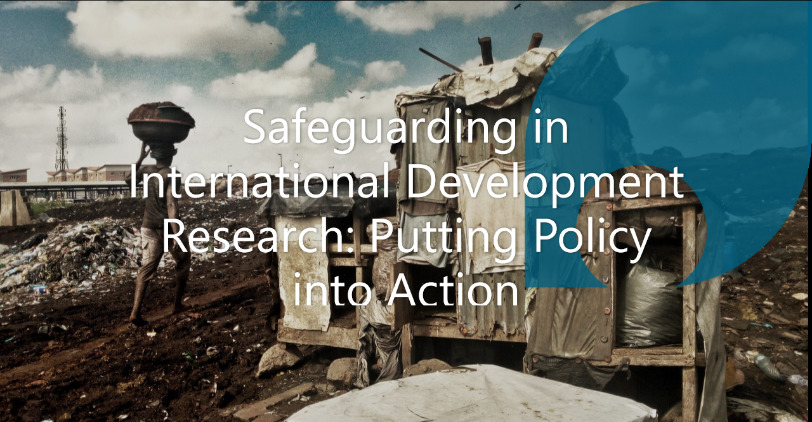
Blog: Safeguarding in International Development Research: Putting Policy into Action
What is safeguarding?
UKCDR defines safeguarding in research as “preventing and addressing any sexual exploitation, abuse, or harassment of research participants, communities and research staff, plus any broader forms of violence, exploitation and abuse… such as bullying, psychological abuse and physical violence”. (UKCDR, February 2020)
On a practical level, safeguarding means taking all reasonable steps to protect staff, partners, research participants and their communities from harm, intended or unintended. This means responding appropriately to any concerns and reports of harm with a supportive, clear, and systematic approach.
Moving from a compliance requirement to a safeguarding culture
Safeguarding is a high priority for international development research funders. At the UK and International Safeguarding Summit in 2018, UKCDR signed an International Development Research Funders Safeguarding Statement to develop and maintain high standards and address all incidents of harm. Since then, UKCDR has launched guidance on safeguarding in international development in an important move to develop best practice and help organisations ‘anticipate, mitigate and address potential and actual harms in the funding, design, delivery and dissemination of research’.
As CHORUS is funded by the UK Foreign, Commonwealth and Development Office (FCDO), we need to apply the FCDO Enhanced Due Diligence on safeguarding throughout our programme. This specifies that safeguarding standards are evident across the key areas of whistleblowing, human resources, risk management, codes of conduct and governance. We have put practical measures in place to meet some of these requirements, but more than that, we must ensure that putting processes in place is not just ticking a compliance box, but that they reflect a reality where safeguarding really is at the heart of our research, our partnerships, and our approaches.
Our Actions
We are a relatively new consortium, embarking on the relatively new safeguarding agenda. Whilst safeguarding literature and resources are widely available now for the aid sector, resources for research consortia are more limited, and we are glad to be able to learn and share with other research consortia, such as the ARISE GCRF hub on accountability in informal settlements, so that we can all develop best practice.
However, the issues covered by the safeguarding agenda are not new or unfamiliar, only the terminology. CHORUS consists of organisations working in different countries, contexts, cultures, organisational structures, and within communities with different realities, concerns and perceptions and risks. An initial challenge for such a consortium is reaching a common position on safeguarding, and one that is owned by the group. To this end, each CHORUS member completed an introductory course, and then each CHORUS organisation has selected a safeguarding focal point, and with the expert facilitation by Safer Edge, our focal points completed 9 hours of interactive and participatory focal point training.
The sessions covered topics such as the role of a focal point, how to receive a report safely, potential barriers to reporting and how to overcome them, and risk assessments and mitigation strategies. The sessions prompted interesting discussions and raised many questions that we will be continuing to explore. For example,
- Is the responsibility to share safeguarding concerns set out in all our job descriptions?
- Is it clear to everyone what happens after a report is made?
- How prepared do people feel to respond to safeguarding concerns?
- How do we communicate with our research participants our safeguarding responsibilities as researchers?
- Have we considered safeguarding in our data management policies and how we use digital devices?
- Do our communications both internally and externally address sufficiently the barriers to reporting a safeguarding concern?
- Is the effectiveness of our safeguarding approach included in our programme monitoring and evaluation?
- Can we align our ethical approval processes within our safeguarding systems?
Our next step as a consortium is to establish a safeguarding focal point working group. We plan to collaboratively define our safeguarding priorities and mitigations, and co-create our safeguarding statements, approaches and expectations. We can thereby create a space where the intricacies of implementation can be openly discussed and reflected on and contribute to a supportive and participatory organisational culture which can respond to the changing dynamics of the complex urban contexts in which we work.
By Polly Spooner, Programme Manager, University of Leeds